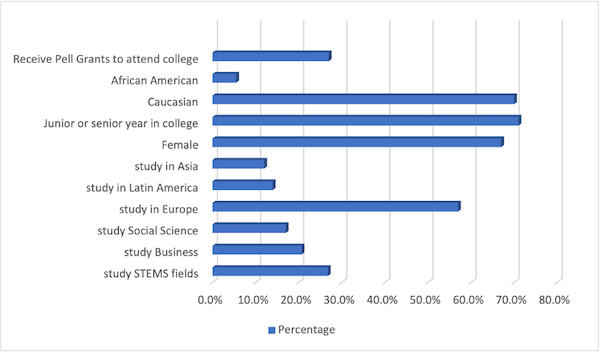Published on
Understanding Why Few American Students Study Abroad

In the newest edition of the 2022 Open Doors Report, U.S. universities’ international student enrollment shows encouraging signs. The number of international students coming to the United States is a reported 948,519, which nears pre-pandemic levels. However, the number of Americans studying abroad in 2020-21 was 14,549, compared to 162,633 in 2019-20 and the high watermark of 350,000 in 2018-19.
The chart below shows how long American students study overseas.

Of the 350,000 students who studied overseas in 2018-19, the majority either studied abroad for a summer or a short term.
What Profile do American Students Who Study Abroad Have?

The number of American students who study abroad represents only 2.7% of American university students who attend four-year and above institutions. Students who study abroad tend to be juniors or seniors in undergraduate school, female, Caucasian, have the financial means and study in Europe.
What Countries Have Tthe Largest Number of Students Studying Abroad?
T.I.M.E. Association, located in France, conducted a study in 2021 of UNESCO mobility data which reported 5.6 million international students worldwide to determine the top countries with the most outgoing students studying in another country. They looked at students’ long-term mobility to complete a whole study cycle and acquire a degree (bachelor’s, master’s or PhD) abroad. The top countries university students leave to study abroad are:
- China—993,367
- India—375,055
- Germany—122,538
- Viet Nam—108,527
- South Korea—101,774
- France—99,488
- United States—84,349 (long-term studies)
Students from other countries study abroad primarily to:
- Access future employment opportunities—at home or abroad
- Access institutional and program quality
- Meet a diverse range of people
- Study and learn differently
- Experience self-reliance and being on their own
- Make new friends and lifelong networking
- See their culture from a different point of view
How Important Is Studying Abroad to the Business Community?
Businesses worldwide are putting more emphasis on international experience. Most big and small companies are trying to attract business and partnerships with international partners. In a 2014 survey titled “U.S. Business Needs for Employees with International Expertise,” 800 executives at U.S. companies were surveyed to identify the demand for corporate employees with international competence including international skills and/or knowledge of foreign languages and world areas. The results call for a continued international business education in the U.S., with increasing emphasis on intercultural communication, foreign language skills and international experience. The 800 surveyed represented a broad cross-section of industries and the number of employees.
Some interesting facts come out:
- 39% failed to fully exploit international business opportunities due to insufficient internationally competent personnel in the past five years.
- 39% have no foreign offices, and all international operations are handled in the U.S.
- 43% state that overall business would increase a great deal if more international expertise were available on staff.
- 60% state that an appreciation of cross-cultural differences is of great importance for professional staff, followed by an understanding of the country’s legal and government requirements (59%) and an understanding of local markets and business practices (58%)
- 83% state their company will place greater emphasis on international competence among management and employees over the next ten years
Additional studies support that studying abroad is better for employers and helps students get jobs. In 2016, The Institute for the International Education of Students (IES), founded in 1950, conducted a comprehensive survey of 1205 of its alumni.
Here are the key points from the study:
- 93% who entered the workforce were employed within six months.
- 89% of those who entered graduate school earned admissions in their first or second-choice school.
- 50% felt that their IES Abroad Program experience helped them to get this first job.
The American Passport Project
How can we encourage and support students to study abroad?
In a recent interview with Higher Ed Without Borders (for which I am a co-host), we asked Dr. Allan Goodman, CEO of the IIE, about a new program they established in 2021 titled The American Passport Project. Dr. Goodman commented that studying abroad is one of the best ways students can acquire global skills and create personal and professional opportunities. Furthermore, it’s a part of IIE’s mission to increase participation and diversity in studying abroad and extend these benefits to all students regardless of socioeconomic status. However, students of limited financial means find it more difficult to study abroad due to financial hurdles, which could prevent them from moving forward.
The American Passport Project plans to help 10,000 students acquire passports by the end of this decade. IIE will help 1,000 college students obtain U.S. passports annually by awarding funds to 40 U.S. colleges and universities in the IIE Network. Each institution will identify 25 first-year students who are eligible for Pell grants. Eligibility will be limited to first-year students to ensure they have ample time remaining in their college career and receive guidance from their advisors to map out a study abroad plan. Competitive institutions will demonstrate grant need, support obtained and impact on study abroad participation.
First-Year Results
- In the inaugural year, nearly 200 institutions applied for the grant to support students obtaining U.S. passports. These institutions informed IIE of the various ways they could utilize the grant to support targeted student populations.
- Forty institutions were selected, and more than 50% of the institutions chosen represent minority-serving student populations (HBCU, HSI, MSI) or are community colleges.
- Nearly 50% of U.S. states are represented (33% South, 32% Midwest, 25% Northeast and 10% West).
- The majority are expanding their diversity, equity, access and inclusion efforts by targeting these top four student populations: students with demonstrated financial need, racial/ethnic minorities, students who have never traveled abroad and first-generation students.
In a follow-up interview with Lindsay Calvert, IIE’s lead for the Passport Project, I asked about the program’s status and the number of IIE-approved studentsas of November 2022.
- 1122 students have been nominated by their awarding institutions and approved by IIE to receive support from IIE-granted funds to help them obtain their U.S. passport and engage in study abroad planning.
- 778 students from the first cohort and344 from the second cohort
- Some institutions can quickly identify, nominate and confirm students. Others have been challenged with their outreach and recruitment, so this process can span over a year to fulfill the goal of 25 students per campus.
- Since the Passport Project aims to support first-year students, it anticipates they will study abroad in the 2023/24 academic year and subsequent years of their undergraduate term.
The Senator Paul Simon Study Abroad Program
In November 2022, The Senator Paul Simon Study Abroad Program Act of 2022 was introduced by U.S. Senators Dick Durbin (D-Ill.) and Roger Wicker (R-Miss.) and U.S. Representatives Cheri Bustos (D-Ill.) and John Katko (R-N.Y.) The act seeks to expand access to study abroad for U.S. college students by enhancing the State Department’s Increase and Diversify Education Abroad for U.S. Students (IDEAS) program and formally renaming it as the Senator Paul Simon Study Abroad Program. Inspired by the vision of the late Sen. Paul Simon (D—Ill.) and the congressionally appointed Commission on the Abraham Lincoln Study Abroad Fellowship Program’s recommendations, the legislation would advance four national goals:
- One million U.S. college students will study abroad annually for credit.
- Study abroad participants will more closely represent the demographics of the undergraduate population in terms of gender, ethnicity, students with disabilities, income level, and field of study.
- A significantly greater proportion of study abroad will occur in nontraditional destinations outside Western Europe.
- Higher education institutions will make studying abroad a critical component of a quality higher education.
U.S. higher education institutions could apply for federal grants, individually or in a consortium, to help them institute programs that would move the country toward achieving these objectives.
Conclusion
I have long wondered why so few Americans go overseas to study, even for a summer. Aren’t they seeing the benefits that students from other countries see? Are they not aware that studying abroad increases their chances of graduation and employment? Perhaps most university students are unaware of studying overseas or believe they can’t afford the cost or cannot give up a part-time job to be away for the summer.
Organizations like IIE are helping address increasing study abroad opportunities with its American Passport Program by emphasizing minorities and nonelite schools. The proposed Simon bill also helps address the issue and pushes for a million students to study abroad, but it remains to be seen if it will pass. It will take bipartisan support and a higher public profile to get through the upcoming Congress. Last and not least are higher education institutions themselves. While the larger state institutions and elite privates have programs and resources to help promote study abroad, that is not necessarily the case with thousands of other colleges and universities. While most schools have international affairs offices, they need more personnel and budget to adequately promote or financially support students. Their priority in fundraising for such programs is lower than other needs.
We need businesses that will benefit from these students and federal and state governments to help promote and partially subsidize this initiative. If companies and governments want to compete for an increasing share of international business successfully, they need employees who have spent time abroad.



